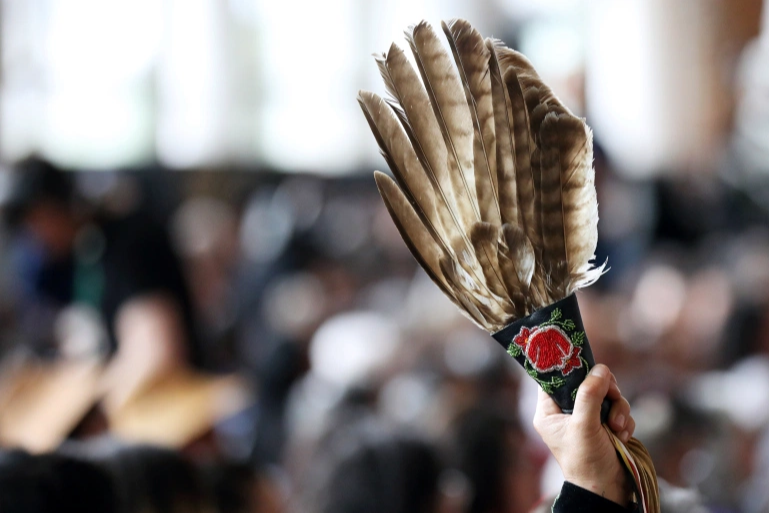
A woman holds eagle feathers during the closing ceremony of the National Inquiry into Missing and Murdered Indigenous Women and Girls in Gatineau, Quebec. (Photo: Chris Wattie/Reuters)
Vancouver, February 15 (RHC)-- Over 100 people marched through downtown Vancouver, Canada, on Sunday afternoon as part of an annual event to honour and remember Indigenous women and girls who have been murdered and gone missing across the country.
Banging drums and singing, the demonstrators walked through the city’s downtown east side on the 30th anniversary of the first such march in Vancouver. The event was livestreamed on Facebook.
“The first women’s memorial march was held in 1992 in response to the murder of a woman in Vancouver,” organizers said in a statement ahead of the event. “Out of this sense of hopelessness and anger came an annual march on Valentine’s Day to express compassion, community, and caring for all women in Vancouver’s Downtown Eastside, Unceded Coast Salish Territories.”
Myrna Cranmer, one of the organisers, told local news outlet The Tyee “the impetus behind the march has always been so that family and community can grieve.”
For decades, Indigenous people across Canada have sounded the alarm about disproportionately high rates of violence faced by women, girls and others in their communities and the inaction of local authorities.
The Native Women’s Association of Canada (NWAC) in 2010 documented 582 cases of missing or murdered Indigenous women across Canada. Then, in 2014 the Royal Canadian Mounted Police (RCMP) reported that nearly 1,200 Indigenous women had been murdered or gone missing between 1980 and 2012. But advocates and community members said the real number was likely far higher.
Amid growing calls for accountability and action to stem the violence, the Canadian government in 2016 launched a National Inquiry on Missing and Murdered Indigenous Women and Girls.
In its final report in 2019, the inquiry found that the violence “amounts to a race-based genocide of Indigenous Peoples” that especially targets women, girls and members of the LGBTQ2S+ community. Two-spirit is a term used by some Indigenous people to express their gender and spiritual identity.
“This genocide has been empowered by colonial structures … leading directly to the current increased rates of violence, death, and suicide in Indigenous populations,” the inquiry said.
In a statement on Sunday to mark the Vancouver memorial march, provincial government officials in British Columbia, including Premier John Horgan, promised to address systemic racism against Indigenous peoples in the province. “In Canada, Indigenous women are three and a half times more likely than non-Indigenous women to be targeted by violence and three times more likely than non-Indigenous women to be killed by someone they know,” they said.
Canada’s Minister of Crown-Indigenous Relations Carolyn Bennett also said the federal government is “working to put in place concrete actions to stop this national tragedy” and develop a national action plan to implement the inquiry’s recommendations.
But Indigenous advocates and community groups have criticised Ottawa for delays in setting up that plan of action. “I’m really disappointed in the process because it’s lack-of,” NWAC President Lorraine Whitman told CBC News in June 2020. “But saying that, I do hope that they’ll start proceeding.”

